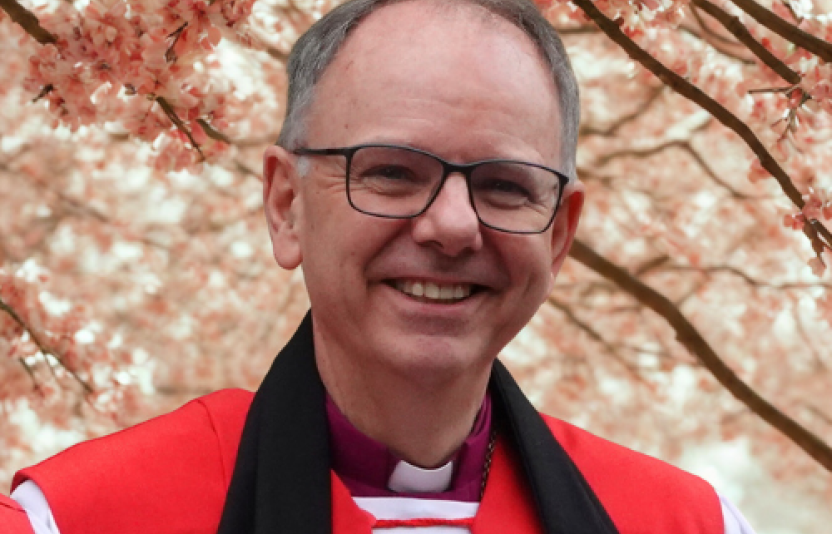Bishop Robert on BBC: Early lessons from Europe on easing Covid-19 lockdown
As Churches in England look to resume public worship from 4 July, Bishop Robert has talked about early lessons from across Europe on easing Covid-19 lockdown in a series of BBC interviews.
Covid-19: Easing lockdown in Europe
Bishop Robert recalled that with Covid-19, we are all experiencing the first global pandemic since the end of the First World War. Its devastating impact in Europe since mid-March has seen 2.6 million cases, and over 195,000 deaths.
He stressed “we don’t want to be Covid hotspots” and outlined the precautionary measures our churches in Europe are taking in our multi-cultural, multi-age settings. He was asked what lessons we could offer to Churches in England ahead of planned re-openings for public worship on 4 July. Bishop Robert said our churches were following national requirements and Diocesan guidance. Pre-registration was in place in order to ensure contract tracing. Measures in place cover physical distancing, limits on congregation sizes, face masks, non-physical contact gestures, and Holy Communion in one kind only. Bishop Robert also emphasized the ministry of cleaning, and importance of honouring the work of cleaners of our churches.
Asked about restrictions on singing among the congregation in church services, the Bishop cited scientific research on this issue concluding that the droplets from breath could risk spreading the virus.
Bishop Robert said “It is back to church but not in the old normal, but the old normal plus, and it is important our people are able to re-gather safely.”
At the same time, Bishop Robert said the diocese had adapted very quickly. He offered examples of virtual worship in the Diocese over these past weeks and months. Across Europe, these had included:
- In Genoa in Italy, where our chaplain there recorded a full virtual Eucharist service in segments on Facebook;
- In another case, our priest on the island of Crete demonstrated his skills with a puppet show to get across his messages about Church in time of Covid-19 in a user-friendly way; and
- Organising a session hosted by one of our clergy from Brussels where children explored building the Kingdom of God on Minecraft.
“Our clergy and church communities have rallied to help older folk in these troubling times with phone calls and food parcels,” Bishop Robert added.
The key challenge now for clergy and chaplaincy councils would be the balance between continuing streamed worship, and physical possibility to worship for some in churches, and working out what “hybrid worship” would look like in their areas, particularly as the adaptation period for Covid-19 could be between two to five years.
Bishop Robert said the message being communicated by churches in our Diocese as they re-open is “everyone is kept safe, and no-one is left behind.”

Black Lives Matter
The Bishop was asked in several interviews about BAME issues.
Bishop Robert stressed Diocese in Europe commitment to the BAME agenda. He noted that among the communities hardest hit by Covid-19 in the Diocese are BAME, and that we have significant Global South membership among our congregations.
The Bishop added that on 12 June the Diocese had held a short prayer service for #BlackLivesMatter in which held a deep silence for 8m 46 secs. Speaking on BBC Radio London, the Bishop emphasised that “Jesus is the Saviour of people of all ethnicities and backgrounds."
Brexit
The third area covered in his interviews was Brexit.
Bishop Robert expressed his concern about the economic impact of Covid-19; and in this context, about “a chaotic UK exit to add to the grief of Covid-19." He noted the EU was aiming to launch a huge Marshall-plan type rescue package.
He added his specific concern regarding UK nationals and their future residency in EU member states:
“They risk being pawns on a political chessboard.”
Bishop Robert noted specifically the decision announced by the French authorities to defer the opening of their portal for UK Residency applications from 1 July to 1 October. This would add real anxiety for people living currently in France.
He told BBC Radio Wiltshire there are an estimated 40,000 UK nationals currently living in the Nouvelle-Aquitaine region alone.
The UK notified the EU in mid-June that it did not wish to seek an extension to the Brexit transition period due to expire on 31 December 2020. On the matter of reaching an agreement on the future UK/EU relationship, Bishop Robert said:
“Let’s hear less talk about tigers in tanks, and pigs in pokes. I urge the leaders to get serious and negotiate a deal.”
However, Bishop Robert welcomed the announcement made relaxing UK quarantine regulations on EU citizens, and said he was looking forward to visiting the UK to see his new grandchild due this month.
You can listen to two of Bishop Robert's interviews on BBC radio stations across the UK on their breakfast programmes at the links below:
BBC Radio London (Recording: 1:40-1:45 on the programme)
BBC Radio Cambridgeshire (Recording: 2:46-2:53 on the programme)


